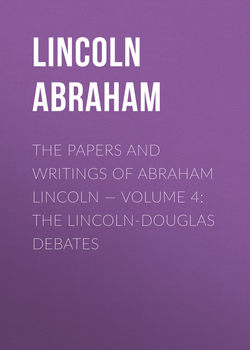The Papers And Writings Of Abraham Lincoln — Volume 4: The Lincoln-Douglas Debates

Реклама. ООО «ЛитРес», ИНН: 7719571260.
Оглавление
Lincoln Abraham. The Papers And Writings Of Abraham Lincoln — Volume 4: The Lincoln-Douglas Debates
LINCOLN AND DOUGLAS FOURTH DEBATE, AT CHARLESTON, SEPTEMBER 18, 1858
Mr. LINCOLN'S REJOINDER
FIFTH JOINT DEBATE, AT GALESBURGH, OCTOBER 7, 1858
SIXTH JOINT DEBATE, AT QUINCY, OCTOBER 13, 1858
Mr. LINCOLN'S REJOINDER
LAST DEBATE, AT ALTON, OCTOBER 15, 1858
Отрывок из книги
FELLOW-CITIZENS: It follows as a matter of course that a half-hour answer to a speech of an hour and a half can be but a very hurried one. I shall only be able to touch upon a few of the points suggested by Judge Douglas, and give them a brief attention, while I shall have to totally omit others for the want of time.
Judge Douglas has said to you that he has not been able to get from me an answer to the question whether I am in favor of negro citizenship. So far as I know the Judge never asked me the question before. He shall have no occasion to ever ask it again, for I tell him very frankly that I am not in favor of negro citizenship. This furnishes me an occasion for saying a few words upon the subject. I mentioned in a certain speech of mine, which has been printed, that the Supreme Court had decided that a negro could not possibly be made a citizen; and without saying what was my ground of complaint in regard to that, or whether I had any ground of complaint, Judge Douglas has from that thing manufactured nearly everything that he ever says about my disposition to produce an equality between the negroes and the white people. If any one will read my speech, he will find I mentioned that as one of the points decided in the course of the Supreme Court opinions, but I did not state what objection I had to it. But Judge Douglas tells the people what my objection was when I did not tell them myself. Now, my opinion is that the different States have the power to make a negro a citizen under the Constitution of the United States if they choose. The Dred Scott decision decides that they have not that power. If the State of Illinois had that power, I should be opposed to the exercise of it. That is all I have to say about it.
.....
[Here Mr. LINCOLN turned to the crowd on the platform, and, selecting HON. ORLANDO B. FICKLIN, led him forward and said:]
I do not mean to do anything with Mr. FICKLIN except to present his face and tell you that he personally knows it to be a lie! He was a member of Congress at the only time I was in Congress, and [FICKLIN] knows that whenever there was an attempt to procure a vote of mine which would indorse the origin and justice of the war, I refused to give such indorsement and voted against it; but I never voted against the supplies for the army, and he knows, as well as Judge Douglas, that whenever a dollar was asked by way of compensation or otherwise for the benefit of the soldiers I gave all the votes that FICKLIN or Douglas did, and perhaps more.
.....